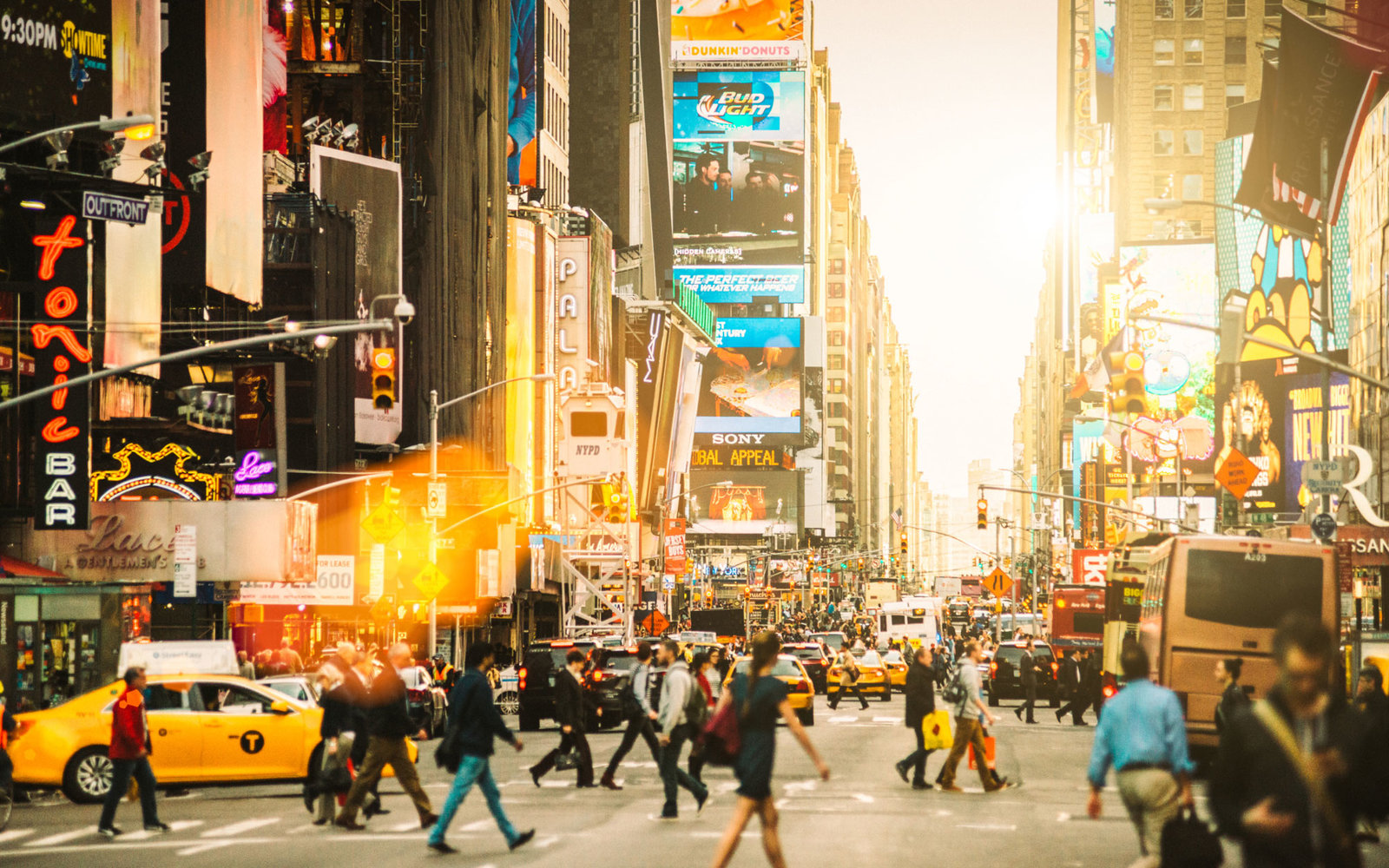
Love it or hate it, Times Square is undeniably one of New York’s most iconic places. Here, nine little-known facts about the crossroads of the world.
Honking horns, guys in Elmo costumes, Disney characters, camera-toting tourists, and half-naked ladies posing for photo opps on the pedestrian plazas—these are all just part of the fabric that makes up the square known as the crossroads of the world. And thanks to its central Manhattan location and status as a major transit hub, millions of people pass through it, whether they want to or not. It’s one of the world’s most Instagrammed locations—even if many consider going there one of the most overrated things to do New York. But for all its maddeningly chaotic, claustrophobia-inducing qualities, Times Square is also one of the city’s most fascinating places full of hidden history and easy-to-miss details. Here are some facts about New York City’s most highly trafficked area that may surprise you.
The iconic building at One Times Square is best known for the New Years Eve ball drop, and in fact, there’s little else there. It was originally constructed as the New York Times headquarters in 1904, back when the area was largely undeveloped. Lehman Brothers bought the building in 1995, and turned it into the giant billboard it is today. Jamestown Properties, which rents out the three bottom floors and the top floor, where the New Year’s Eve ball is stored year-round, currently owns it. Most of the floors are vacant, covered in graffiti and decrepit, but the billboards generate over $23 million per year.
The area we know as Times Square was called Longacre Square until the Times moved their headquarters there in 1904, though they outgrew the building in 1913. Despite the name, it’s not a square at all. Anyone who’s been there knows it’s actually a triangle because Broadway intersects the grid on a diagonal.
You would never know it now that the streets have been totally Disneyfied, but in the 1960s ‘70s, and ‘80s prostitutes, peep shows, and adult movie palaces plagued Times Square. Drug use and crime were rampant. This was the New York of Taxi Driver, when both tourists and locals avoided the area because it was one of the city’s most dangerous neighborhoods. In 1981, Rolling Stone called West 42nd Street the “sleaziest block in America.”
It’s almost impossible to notice, but there’s a permanent sound installation emanating from a subway grate. Go to the triangular area between 45th and 46th Streets and Broadway and listen closely. Artist Max Neuhaus created a textured layering of sounds that plays on a loop 24 hours a day. The installation is maintained by the Dia Foundation, which is behind Dia Beacon and several other quirky art installations around the city.
Next time you’re passing through the 42nd Street Times Square subway station, be sure to look up at the mural by pop artist Roy Lichtenstein. A native New Yorker, Lichtenstein—whose paintings appear at MoMA, the Met, and beyond—jumped at the chance to create a public piece for the subway. Inspired by comic strips, it depicts a futuristic train shooting through an underground station.
Times Square has been the center of New York’s Theater District since the early 1900s, though the theaters have undergone many ups and downs since then. Many of the opulent theaters built at the turn of the century became movie palaces after the Great Depression, porno theaters, or were altered or torn down. But there are a few places where you can still see the remnants of those glorious theaters, like the former Loews Mayfair Theater that’s now a souvenir shop on 47th Street and 7th Ave.
Everyone knows the iconic photograph of a soldier kissing a nurse in Times Square at the end of WWII, but no one actually knows who the people in the photo are. Alfred Eisenstaedt, a photographer for Life Magazine, captured the unforgettable image, but he wasn’t the only photographer shooting pictures that day. Still, the subjects’ identities remain an unsolved mystery.
Concealed inside an unmarked townhouse on W. 46th Street, Bar Centrale is a favorite haunt of Broadway actors like Alessandro Nivola. Though there are many excellent hidden bars and restaurants in New York, this is the only one in the Theater District and it’s known for its discretion.
If you’ve ever passed through after dark, you know that the light pollution here is real. Even after sunset, it feels like the land of the eternal sunshine. In fact, Times Square is so bright, it’s one of the few places on earth that astronauts can pinpoint from outer space.